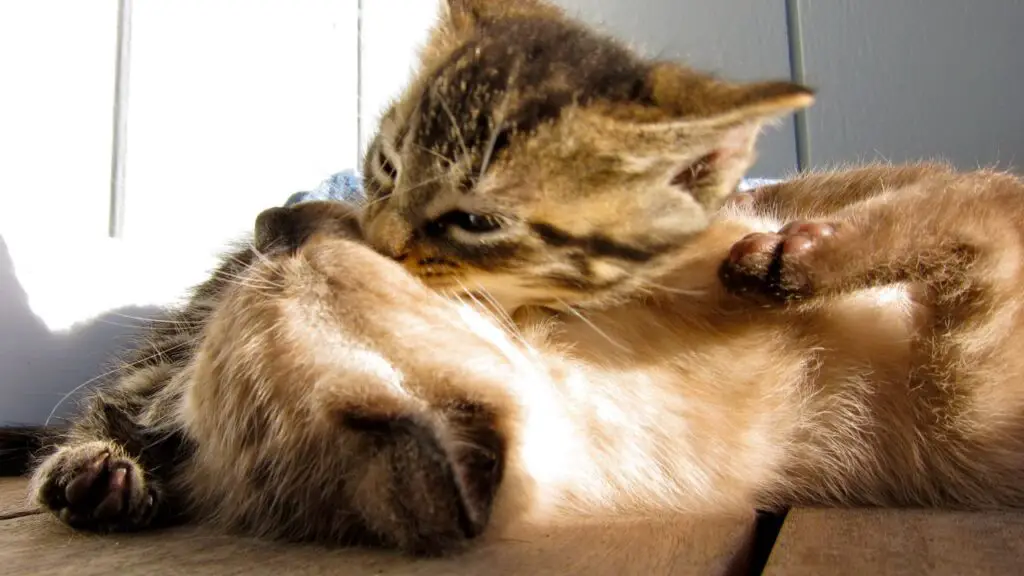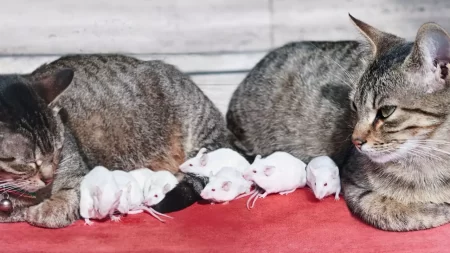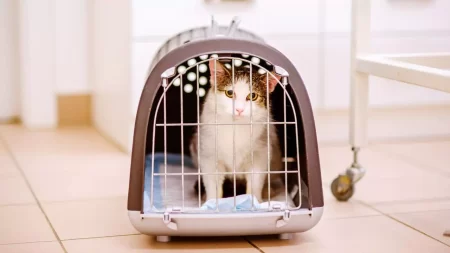There are several possible reasons why male cats bite female cats on the neck. Some of the common reasons are:
- Mating behavior: Male cats bite female cats on the neck as part of the mating process. This helps to stimulate ovulation in the female cat and to hold her in place during copulation. The bite is not meant to hurt or injure the female cat, but it may cause her to make a loud noise.
- Dominance display: Male cats may also bite female cats on the neck to show their dominance over them. This can be a way of marking their territory or asserting their control over resources such as food, toys, or sleeping spots. The bite is usually gentle and does not cause harm, but it may make the female cat feel uncomfortable or annoyed.
- Playful behavior: Sometimes, male cats may bite female cats on the neck as a form of play. This can be a way of practicing their hunting and fighting skills or expressing their affection. The bite is usually soft and does not break the skin, but it may be accompanied by other playful actions such as chasing, pouncing, or wrestling.
Are there any risks or health concerns associated with male cats biting female cats’ necks?
There are some risks or health concerns associated with male cats biting female cats’ necks, depending on the reason and intensity of the bite. Some of them are:
- Hair loss: If a male cat bites too hard on the female cat’s neck, it can cause hair loss on the nape of the neck that he bites1.
- Infection: If a male cat breaks the skin of the female cat’s neck with his teeth, it can cause infection or abscesses that may require veterinary treatment.
- Stress: If a male cat bites a female cat’s neck to show dominance or territoriality, it can cause stress or anxiety to the female cat, especially if she feels threatened or intimidated. This can affect her well-being and behavior.
- Pregnancy: If a male cat bites a female cat’s neck as part of mating behavior, it can trigger ovulation and pregnancy in the female cat, if she is not spayed. This can lead to unwanted litter and health complications for the female cat.
What is the role of hormones in male cats biting female cats’ necks?
The hormones present in male cats play an essential role in their behavior of biting the female cat’s neck during mating.
Neck biting stimulates hormones and ovulation in the female cat, which is necessary for the female to become pregnant.
Although young kittens don’t commonly exhibit such behavior during social play, once male cats reach their sexual maturity, they begin to display the behavior of mounting, pelvic thrusts, and neck biting.
Testosterone and its derivatives chiefly regulate these behaviors. The intact male’s penis is barbed to stimulate the female cat further.
Generally, biting a female cat’s neck will not harm her but rather protects her during mating.
Female cats can also be territorial and exhibit similar behavior as males.
Therefore, it is essential to understand the role of hormones in the behavior of male and female cats during their reproduction process.
How do female cats typically respond to male cats biting their necks?
Mating in cats involves male cats biting the neck of female cats, asserting dominance, and keeping them steady.
Though appearing forceful, this is a typical mating practice. Initially, the female might yowl and reject the male, but with time, she may accept his advances.
Both male and female cats can exhibit territorial traits, so monitoring interactions among several cats is crucial.
Sudden behavioral shifts in a cat warrant contacting a vet for a comprehensive health check.
Generally, female cats’ reactions to neck biting vary, yet it remains a standard aspect of their mating habits.







